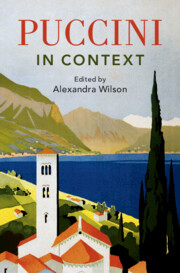Book contents
- Puccini in Context
- Composers in Context
- Puccini in Context
- Copyright page
- Contents
- Figures
- Table
- Notes on Contributors
- Preface
- Part I Formative Influences
- Part II Puccini’s Places
- Part III Influences and Interests
- Part IV Bringing Puccini to the Stage
- Part V Image and Reputation
- Part VI Puccini through a Political Lens
- Chapter 22 Puccini and Religion
- Chapter 23 Puccini and Politics
- Chapter 24 Gender Politics in Puccini’s Operas
- Chapter 25 The Racial Politics ofMadama ButterflyandTurandot
- Part VII Interpreting Puccini
- Part VIII Legacy
- Bibliography
- Index
Chapter 24 - Gender Politics in Puccini’s Operas
from Part VI - Puccini through a Political Lens
Published online by Cambridge University Press: 31 August 2023
- Puccini in Context
- Composers in Context
- Puccini in Context
- Copyright page
- Contents
- Figures
- Table
- Notes on Contributors
- Preface
- Part I Formative Influences
- Part II Puccini’s Places
- Part III Influences and Interests
- Part IV Bringing Puccini to the Stage
- Part V Image and Reputation
- Part VI Puccini through a Political Lens
- Chapter 22 Puccini and Religion
- Chapter 23 Puccini and Politics
- Chapter 24 Gender Politics in Puccini’s Operas
- Chapter 25 The Racial Politics ofMadama ButterflyandTurandot
- Part VII Interpreting Puccini
- Part VIII Legacy
- Bibliography
- Index
Summary
This chapter is about Puccini’s operas and gender politics. It explains that Puccini’s operas have been read as particularly damaged and damaging in their representation of women, but argues that a nuanced study of gender in these works needs to look beyond a simple ‘body count’. The author examines how male and female deaths are differentiated musically, arguing that the former are contained and lacking in self-expression, whereas the latter tend to be extravagant and extended. The chapter discusses how gender has been considered in the Puccini literature, paying particular attention to Mosco Carner’s Freudian psychoanalytic reading of the works. It also examines Puccini’s own attitudes towards gender, so far as they are known. The chapter closes with a discussion of queer interpretations of Puccini’s oeuvre, a growing criticism of Puccini’s gender politics by feminist musicologists, and the recent casting of transgender and non-binary performers in Puccini’s works.
- Type
- Chapter
- Information
- Puccini in Context , pp. 197 - 204Publisher: Cambridge University PressPrint publication year: 2023

